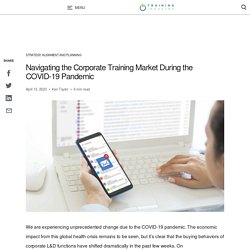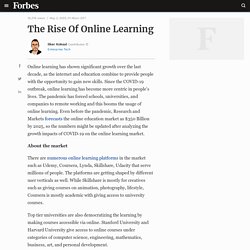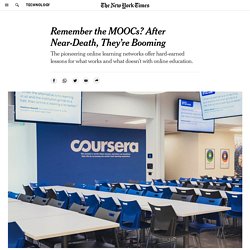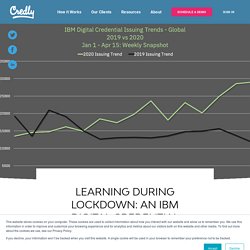

Making Learning a Part of Everyday Work. As automation, AI, and new job models reconfigure the business world, lifelong learning has become accepted as an economic imperative. Eighty percent of CEOs now believe the need for new skills is their biggest business challenge. For employees, research now shows that opportunities for development have become the second most important factor in workplace happiness (after the nature of the work itself).
At the most fundamental level, we are a neotenic species, born with an instinct to learn throughout our lives. So it makes sense that at work we are constantly looking for ways to do things better; indeed, the growth-mindset movement is based on this human need. And whereas recruitment is an expensive, zero-sum game (if company A gets the star, company B does not), learning is a rising tide that lifts all boats. Keeping Up with Professional Development During the Pandemic. Many employees need to accumulate credits to keep their professional credentials, and they may look forward to large gatherings with their peers each year where they can learn about the latest developments in their industry.

But the coronavirus pandemic is changing the way employees and businesses are approaching professional development, with many opting—at least for now—for online learning. "We've seen a large shift in the manner in which these things are being done," said Melissa Peters, an attorney with Littler in Walnut Creek, Calif. Since March 31, the U.S. State Department has advised U.S. citizens to avoid all international travel due to COVID-19. Within the U.S., the Centers for Disease Control and Prevention (CDC) had urged residents of New York, New Jersey and Connecticut to temporarily halt nonessential domestic travel and asked people everywhere in the country to carefully consider the risks before traveling.
Workplace learning during coronavirus. As businesses around the world postpone and cancel in-person meetings in response to the novel coronavirus (or SARS-CoV-2), which causes the COVID-19 disease, workplace learning is emerging as one of the earliest and hardest-hit business activities.

Based on our observations as of early March, roughly one-half of in-person programs through June 30, 2020, have been postponed or canceled in North America; in parts of Asia and Europe, the figure is closer to 100 percent. However, businesses can’t afford to put capability building on hold. Whether the effort is reskilling at the business-unit level or a company-wide aspirational transformation, companies can’t simply push the pause button on critical workplace learning, even as they move rapidly to put employee safety first. Beyond tactical steps, there are strategic measures, such as exploring alternative digital learning strategies, that managers can develop during this time of social distancing. 500 CEO survey on how top companies are dealing with coronavirus pandemic, predictions for what's ahead. Workplace learning during coronavirus. Navigating the Corporate Training Market During the COVID-19 Pandemic.
We are experiencing unprecedented change due to the COVID-19 pandemic.

The economic impact from this global health crisis remains to be seen, but it’s clear that the buying behaviors of corporate L&D functions have shifted dramatically in the past few weeks. On TrainingIndustry.com, we’ve seen changes in the content and solutions attracting the most attention from our audience, which provides a glimpse into the challenges training professionals are currently experiencing — and how we can connect them with the resources they need to minimize business disruption during this turbulent time. This article will share our observations on the information and solutions that training professionals are currently seeking and research-based recommendations on how training companies can meet their needs. Searching for Solutions We’ve seen an elevated interest in virtual training through an increase in registrations and attendance for our webinars, virtual conferences and podcasts.
Moving Forward. The Rise Of Online Learning. About the market There are numerous online learning platforms in the market such as Udemy, Coursera, Lynda, Skillshare, Udacity that serve millions of people.

The platforms are getting shaped by different user verticals as well. While Skillshare is mostly for creatives such as giving courses on animation, photography, lifestyle, Coursera is mostly academic with giving access to university courses. Top tier universities are also democratizing the learning by making courses accessible via online. Stanford University and Harvard University give access to online courses under categories of computer science, engineering, mathematics, business, art, and personal development.
Global Learner Pulse Survey Wave II May 2020. Cisco CEO says 5.5 billion minutes of Webex meetings due to coronavirus. Cisco CEO Chuck Robbins told CNBC on Tuesday that the company’s video conferencing platform Webex saw a surge in user activity since the beginning of the month due to the coronavirus pandemic.

“In the first 11 business days of March, we’ve had 5.5 billion meeting minutes,” Robbins said on “Squawk on the Street.” “Yesterday we held 3.2 million meetings globally on Webex, and that doesn’t include one on ones. Those are multi-individual meetings.” Companies are shifting operations online in a bid to slow COVID-19. In the United States, at least 4,661 coronavirus cases have been confirmed and at least 85 people have died, according to Johns Hopkins University. Subscribe to CNBC on YouTube. Remember the MOOCs? After Near-Death, They’re Booming.
Sandeep Gupta, a technology manager in California, sees the economic storm caused by the coronavirus as a time “to try to future-proof your working life.”

So he is taking an online course in artificial intelligence. Dr. Robert Davidson, an emergency-room physician in Michigan, says the pandemic has cast “a glaring light on the shortcomings of our public health infrastructure.” So he is pursuing an online master’s degree in public health. Children and college students aren’t the only ones turning to online education during the coronavirus pandemic.
Coursera, in which Mr. “Crises lead to accelerations, and this is best chance ever for online learning,” said Sebastian Thrun, a co-founder and chairman of Udacity. Coursera, Udacity and edX sprang up nearly a decade ago as high-profile university experiments known as MOOCs, for massive open online courses. The sites even became a punchline among academics: “Remember the MOOCs?” The proclaimed mission of the MOOCs was to “democratize education.”
Learning During Lockdown: An IBM Digital Credential Case Study. This post was written by Jim Daniels, Senior Program Manager for IBM’s education and credentialing program.

On the frontlines of IBM’s training and education programs, we have seen and experienced many milestones influenced directly by our organization’s digital credentialing strategy. Learner engagement has improved by a significant margin, digital course completion rates have increased exponentially, and skills coverage insights are dramatically improved. These outcomes are achieved in large part by the implementation of a comprehensive credentialing framework to extend the application of digital credentials across the entire learning journey and not limiting them to only the highest stakes achievements.